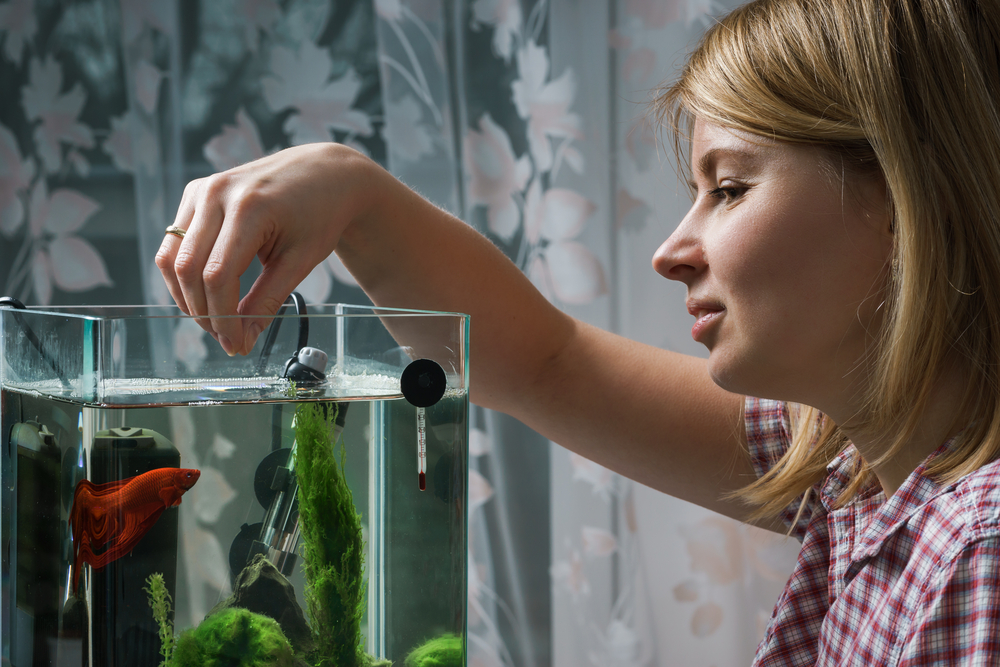Have you ever looked at your betta fish and wondered if there’s more going on in their pretty heads? Well, guess what? Betta fish are smarter than you think! They can learn tricks, just like dogs.
Training your betta isn’t just fun and games; it’s a great way to hang out with your fishy friend and keep them happy, potentially increasing their lifespan and making them healthy. Even though they might not be solving puzzles, bettas can learn to follow your finger, jump through hoops, and all sorts of cool stuff!
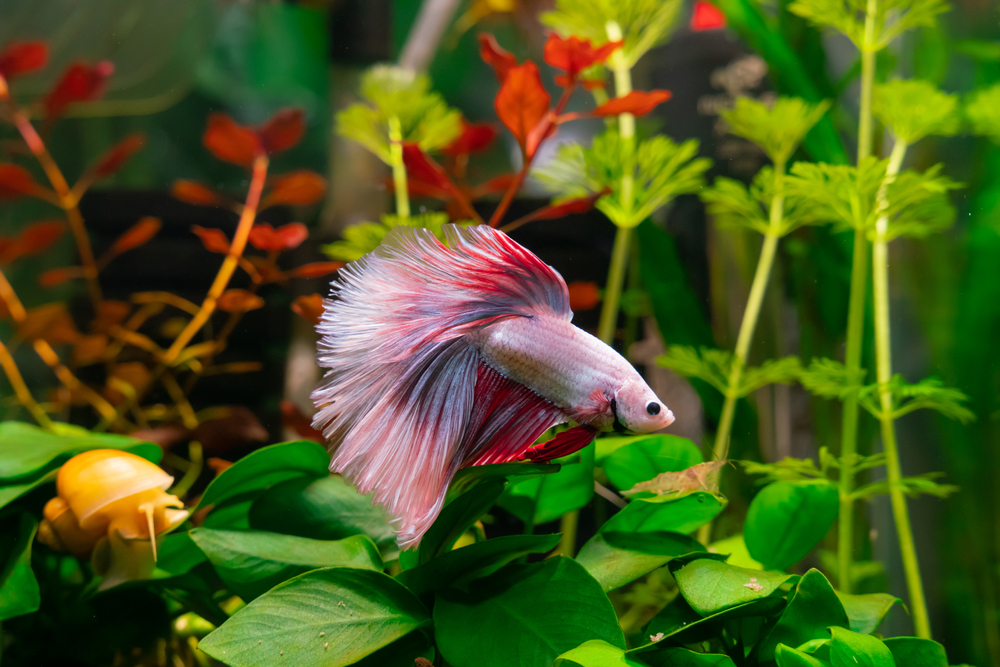
So, are you ready to reveal your betta’s inner genius? This guide will show you how to do it step by step. We’ll start by ensuring your betta is comfy and happy, then jump into some easy training tricks to help you train your Betta fish. So, get ready to bond with your betta in a new way and have some fun along the way!
Contents
How to Train a Betta Fish
Training a betta fish takes patience and understanding of their behavior. To create a stimulating environment and train your betta fish effectively, you’ll need to cover the basics, which are outlined below:
Also, don’t miss out on these other top sought posts :
Understanding Betta Fish
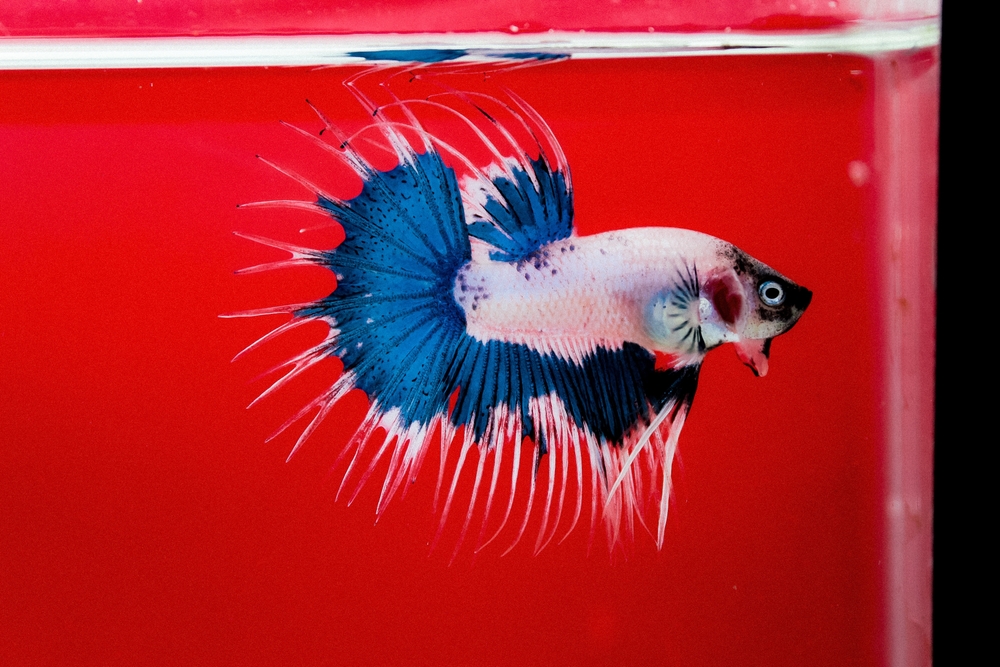
Betta fish are known for their vibrant colors and dynamic personalities. They are territorial by nature, especially the male bettas, which makes it vital to gain their trust before beginning any training regimen. These fish can recognize their trainers and perform tricks, but developing a bond is the first step.
By building a trusting relationship with your betta fish, you can reveal their full potential and enjoy a rewarding experience. Start by moving slowly and calmly around the tank, allowing your betta to become comfortable with your presence.
Remember that betta fish may fight with other fish, so keeping them separate is best. With proper care and attention, your betta fish can thrive and become a beloved, low-maintenance pet.
Creating a Suitable Environment
Keep an ideal and well-maintained betta tank that holds at least 5 gallons of water to provide adequate space for swimming and exercise. A comfortable environment includes a consistent water temperature (between 76 and 81 degrees Fahrenheit) and a pH level of around 7.0.
Also, provide a filter; a filter is vital for clean water, but it’s important to remember that it should have a gentle flow to avoid stressing out your betta.
And let’s remember live plants! Not only do they make your aquarium look super pretty, but they also offer some much-needed hiding spots for your betta to feel more secure.
Essential Training Supplies
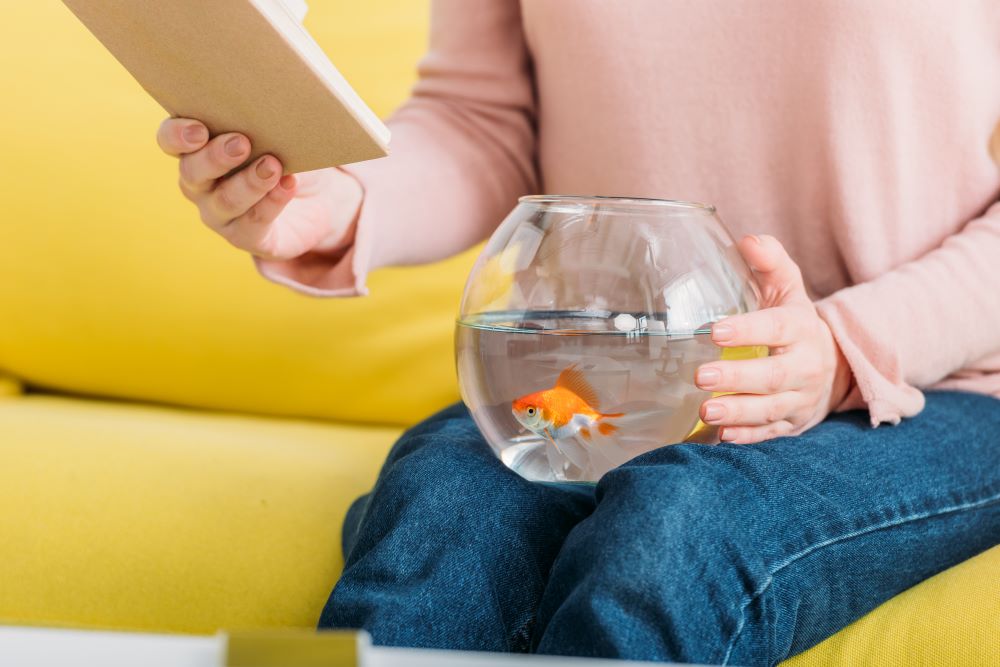
Utilize the following tips to train your betta fish effectively:
- Use a small mirror to encourage flaring, a natural behavior that can be leveraged in training routines.
- Utilize training sticks or pens (preferably red or black) to direct attention during exercises.
- Consistency is key, so use the same colored tool to prevent confusion and establish recognition.
By understanding betta fish behaviors, providing a wholesome environment, and equipping yourself with vital training supplies, you can set a solid foundation for teaching your betta fish various tricks and commands in a way that is both enjoyable and rewarding.
Basic Training Techniques
Training your betta fish can be rewarding and improve your interaction with your aquatic pet. However, consistency and patience are key, so let’s get started with some basic training techniques to engage your betta.
Earning Your Betta’s Attention
The first step in training your betta is to capture their attention. Start by placing your hand on the outside of the tank and moving it slowly to make your presence known. Bettas are naturally curious, and your movements can encourage them to come closer. A gentle tap on the glass can also be effective, but it’s important not to startle them.
The First Command: Follow the Finger
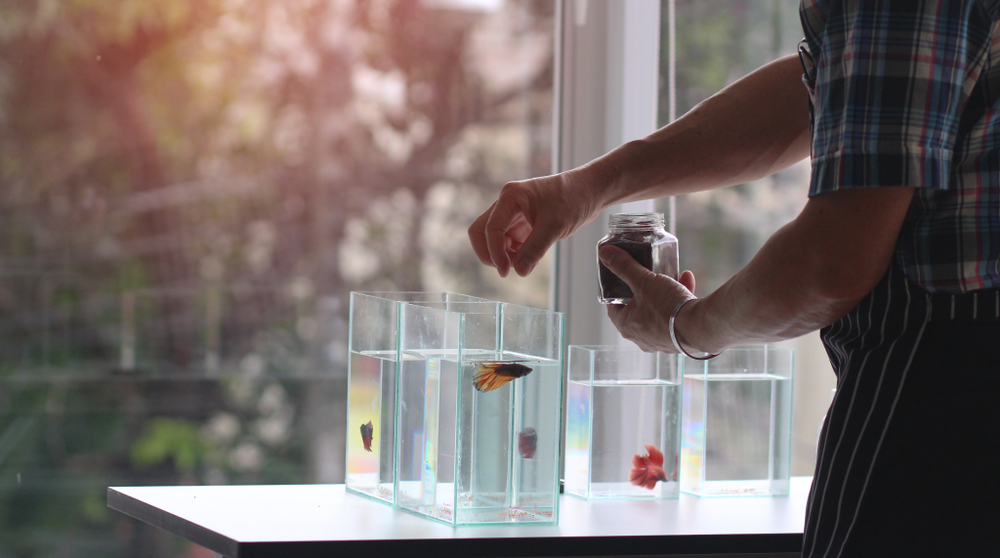
Once you have your betta’s attention, teach it to follow your finger. Begin by placing your finger against the glass and ensuring it notices it.
Once the betta focuses on your finger, move it slowly along the glass, rewarding the fish’s following movement with a treat, such as a small piece of food. This reinforces the behavior and helps establish a bond between you and your betta.
Teaching Your Betta to Swim Through Hoops
For more advanced training, encourage your betta to swim through a hoop. Start by introducing a hoop into the tank and allowing your betta to get accustomed to it. Use a stick with some food, make the fish swim through the hoop, and offer a treat as a reward.
With repetition, your betta can learn to associate swimming through the hoop with receiving food, which may be a fun game for both of you. Incorporating items like a ping pong ball can further stimulate your betta’s interest and provide additional exercise, keeping them healthy and engaged.
Advanced Tricks and Activities
Training your betta fish can be entertaining. With patience and consistent positive reinforcement, you can teach your betta a variety of advanced tricks and engaging activities beyond simple tasks.
Training Your Betta to Jump
Bettas have a natural ability to jump, and with the proper technique, you can train them to do so on command. Here’s how:
- Hold a feeding stick with a betta food pellet above the water surface.
- Reward your betta with the pellet each time it jumps.
- Gradually increase the height to challenge and reinforce the behavior.
This technique trains your bettas to jump on command, providing mental and physical stimulation.
Interactive Games for Bettas
Play a fun game of betta soccer! Float a ping-pong ball in the tank and encourage your betta to push or nose it using target training and rewards. This interactive game challenges and engages your betta, making it a great activity and an impressive trick!
Maintaining A Healthy Training Routine
To maintain a healthy betta training routine, you want to provide a balanced diet, monitor stress levels, and follow a consistent schedule. This will increase your betta’s well-being and ensure optimal training conditions.
Feeding Time and Rewards
Betta fish thrives on a routine feeding schedule. Provide high-quality food at the same time daily, ensuring it meets their nutritional needs. During training, occasionally incorporate treats as a reward, encouraging your betta to participate and strengthening your bond. Use these treats sparingly to avoid overfeeding.
Monitoring Stress and Aggression
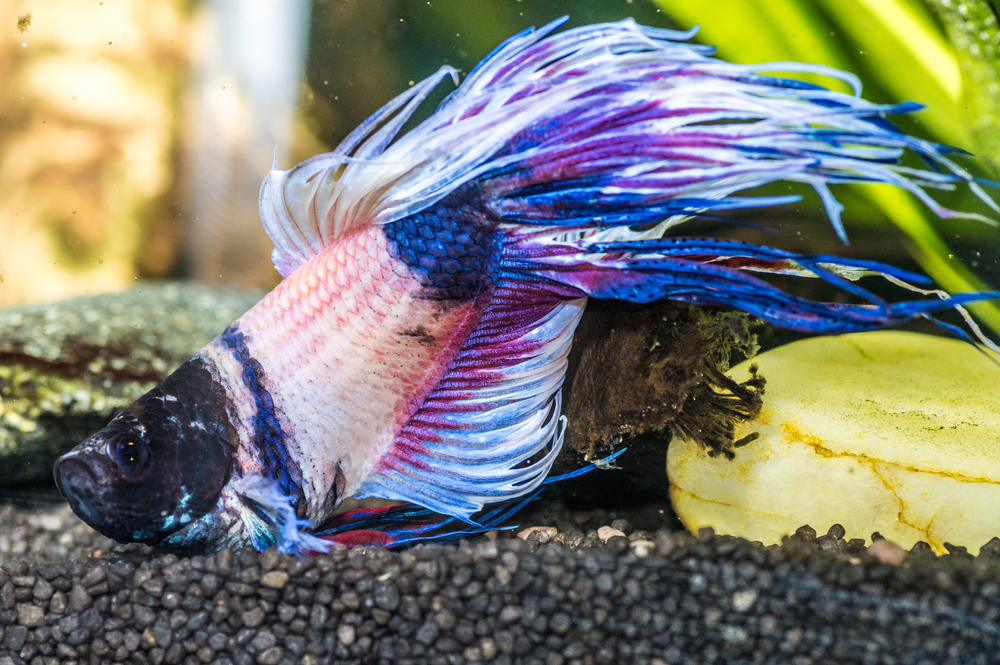
Bettas are prone to stress and aggression, which can be worse by overtraining. To mitigate this, do the following:
- Watch for signs of stress, including loss of color and reduced appetite.
- Provide regular breaks to prevent undue stress.
- Use a mirror to safely redirect your betta’s natural aggression, allowing it to flare without causing harm.
- Manage interactions to maintain a stress-free environment.
Conclusion
Alright, that’s all there is to it! Training your betta fish is a fun adventure that strengthens the bond you share with your little underwater friend. It might require some patience, but the moment your betta masters a new trick, the excitement will be fantastic! Plus, keeping their minds active not only makes them happy but also keeps them healthy.
So grab some yummy treats and prepare for some playtime, and who knows, your betta might just become the smartest fish in the tank. Imagine bragging to your friends about your betta’s amazing skills—they’ll be blown away!
So why not try Betta training? It can be a rewarding experience for both of you, and you might discover a hidden talent in your beautiful betta fish.
Frequently Asked Questions
Training your Betta can vary greatly, although some standard methods and techniques are practical and enjoyable for your fish. Let’s answer some specific questions you tend to ask as a Betta owner.
Can betta fish learn their Name?
While bettas are intelligent and curious creatures, they don’t have the same language capabilities as humans. However, many people report that their bettas respond to their names or certain sounds, such as the sound of the food container or a specific phrase.
This is possible because bettas have the ability to associate certain sounds with positive experiences, such as feeding time or interaction with their owner. So, while your betta may not understand the concept of a “name,” as a dog or cat might, it can still learn to respond to certain sounds in its environment.
Do bettas recognize their owners?
Betta fish are known for their intelligence and curiosity, and many owners say that their bettas recognize them and respond to their presence.
However, it’s important to note that bettas don’t see or hear the same way humans do, so their recognition is likely based on changes in their environment or their owner’s behavior. For example, your betta may associate your presence with feeding time or a change in water temperature.
What techniques can be employed to get a betta fish to follow your finger?
Start by having your Betta associate your finger with food; gradually increasing the distance between your finger and their food can encourage them to follow.
How can aggression be managed or reduced in betta fish training?
Manage aggression by providing a spacious environment, avoiding overcrowding, and introducing stimuli gradually to not overwhelm them.
Do betta fish like to be talked to?
While bettas don’t have the same auditory capabilities as humans, they can still respond to sounds and vibrations in their environment. Some aquarists confirm that their bettas seem to enjoy being talked to or sung to and may even swim toward the source of the sound.
However, it’s essential to remember that bettas are sensitive to environmental changes, so it’s best to keep noise levels low and avoid sudden loud noises while training them.
How can I play with my betta fish?
Playing with your betta fish can differ slightly from other pets, but it’s still possible! One way to play with your betta is to provide them with toys such as floating logs or balls they can swim through. You can also try training your betta to do tricks like swimming through hoops or coming to the water’s surface when you call it.

Ian Sterling, founder of Fishlab.com, began his aquarium journey over 30 years ago, driven by a deep fascination for fish and their diverse personalities. His website, Fishlab.com, is dedicated to making fishkeeping accessible and enjoyable, offering beginner-friendly guidance, expert insights, and a community for aquarists to connect and share experiences.


